Select Language

WASHINGTON (Reuters) - The average rate on the popular U.S. 30-year mortgage rate fell below 7% this week for the first time in more than a month, which could help revive the housing market's waning fortunes.
The 30-year fixed-rate mortgage averaged 6.94% during the week ending May 23, the lowest level and first reading below 7% since the second week of April, down from 7.02% in the prior week, mortgage finance agency Freddie Mac said on Thursday.
It averaged 6.57% during the same period a year ago. Data this month showed the housing market taking a step back in April after a strong performance in the first quarter. Existing and new home sales fell last month. Single-family housing starts and building permits also declined in April.
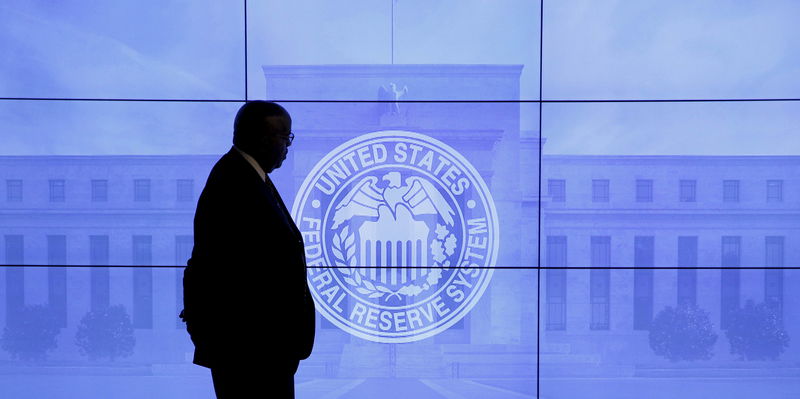
A recent survey by Strategas reveals that investors are largely anticipating the Federal Reserve to commence rate cuts in September, despite persistent hawkish sentiments.
Weak U.S. economic data for April did not prompt Strategas clients to bring forward their expectations to June or July.
Notably, the survey indicates that most of the firm's clients foresee only three rate cuts through May 2025, a significant shift from the January survey, where expectations included 100 basis points of cuts within the year.
Fed officials continue to advocate for patience to ensure inflation remains anchored, which Strategas says suggests further disinflation is necessary before initiating rate cuts.
In addition, they feel that while restrictive rates are pressuring the economy, a significant deterioration in employment could expedite Fed action.
However, absent "an unanticipated weakening in the labor market, we expect cuts will start in September," said Strategas.
The firm's survey also highlighted that the mean forecast for the Fed funds rate three months forward stood at 541 bps in May, with some clients still expecting cuts as early as June or July.
For the six-month outlook, encompassing the September and November meetings, the mean rate fell 6 bps in May to 519 bps, indicating at least one cut by November.
"Standard deviations widened in the near term and long term while narrowing 12 months forward," added the firm. "This tells us respondents are more confident about where we'll be in a year, but uncertain about the road to get there."
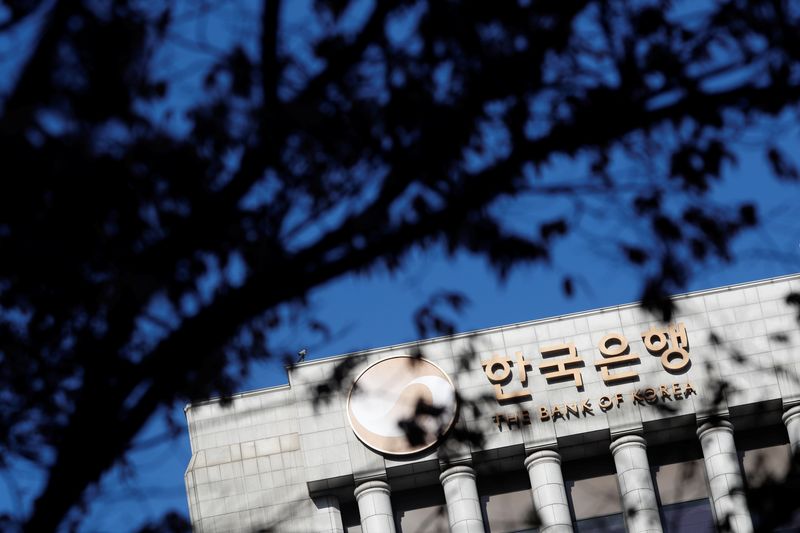
By Cynthia Kim and Jihoon Lee
SEOUL (Reuters) -South Korea's central bank held interest rates at a 15-year high on Thursday and struck a balanced policy tone while reiterating risks around inflationary pressures in the wake of stronger-than-expected economic growth.
Governor Rhee Chang-yong said for now the Bank of Korea will continue to keep policy restrictive at the current 3.50% benchmark rate amid sticky inflation and the surprise first-quarter growth performance.
"There are expectations for interest rate cuts in the second half, but uncertainties over the timing of it is now even greater," Rhee told a press conference soon after the BOK unanimously held its key rate steady, as expected by all 43 analysts polled by Reuters.
"It's not like growth is excessively hot so it is desirable to normalize restrictive interest rates should inflation stabilizes to the target level which we are hoping for."
The BOK also raised growth forecast for this year to 2.5% from 2.1% after Asia's fourth biggest economy grew at its quickest pace in two years in the first quarter.
The bank kept its February inflation outlook for this year at 2.6%, as the impact from stronger growth "was not seen big enough to alter" the forecast, Rhee said.
South Korea’s policy-sensitive three-year treasury bond futures started to rise after the BOK kept its inflation forecast for this year and extended gains to as much as 0.13 points to 104.54 during Rhee’s news conference.
"There is some relief in the market that the BOK maintained its inflation outlook, and given that short-term outlook among board members remains the same, expectations the BOK will start cutting rates in the second half is very much alive," said Ahn Jae-kyun, an analyst at Shinhan Securities, who sees a 25 basis-point cut in the fourth quarter.
The BOK's tightening cycle began earlier than most global peers in mid-2021, with policy interest rates rising by a cumulative 300 basis points to 3.50%.
As with the rest of the world, the central bank is closely monitoring the debate around the timing of the Federal Reserve's interest rate cuts, as any easing in the U.S. could drive up the won and alter inflation dynamics.
South Korean Inflation is coming down, as April headline data showed an easing for the first time in three months to 2.9%, but it remains above the BOK's target rate of 2%.
Median forecasts show analysts see the benchmark interest rate will remain unchanged through the third quarter before a 50 basis-point cut in the fourth quarter, as some pushed back their timing of cuts after the stronger-than-expected GDP data.
In an April survey, the consensus view predicted 25 basis-point cuts each in the third and fourth quarter.
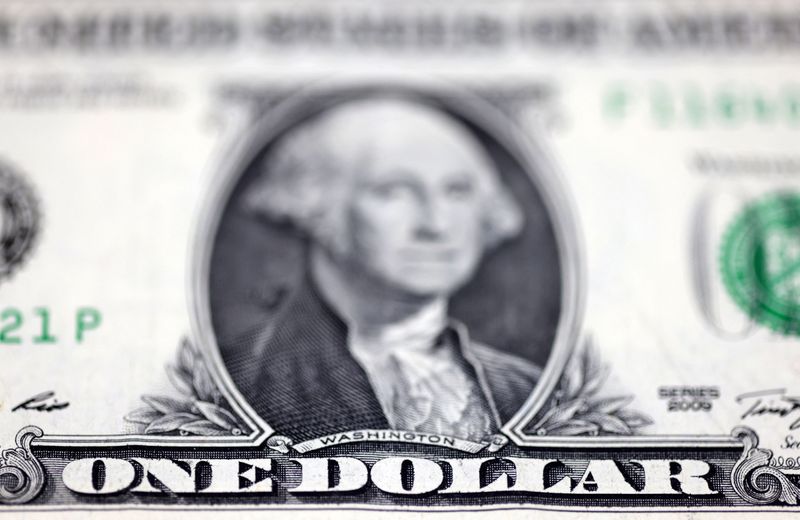
By Kevin Buckland
TOKYO (Reuters) -The dollar hovered near a one-week high on Thursday following its best day this month against its major peers after minutes of the last Federal Reserve meeting revealed a willingness to raise interest rates among some officials.
The New Zealand dollar continued its climb as an unexpected rise in local retail sales added to hawkish guidance from the central bank a day earlier to push back bets for rate cuts.
Sterling remained firm after jumping to a one-month peak following hotter-than-expected inflation, and also drew support from the announcement of a UK parliamentary election for July 4.
Ether continued to hover near Tuesday's more than two-month peak amid speculation over the potential approval of U.S. spot exchange-traded funds that would track the world's second-biggest cryptocurrency.
The dollar index, which tracks the currency against six major rivals including sterling, the euro and yen, was little changed at 104.85 after gaining 0.28% overnight.
Fed officials at their April 30-May 1 session indicated they still had faith that price pressures would ease, if only slowly, but the meeting summary also reflected discussion of possible tightening.
"The minutes revealed concerns that inflation might not decline as quickly as hoped and that some members are open to further rate hikes if needed," supporting the dollar, James Kniveton, senior corporate FX dealer at Convera, wrote in a note to clients.
"Consequently, expectations for the first rate reduction have shifted from September to November. With the Federal Reserve meeting occurring just after the U.S. elections, early November could see significant market volatility."
The dollar was little changed at 156.755 yen after rising to 156.85 overnight, the highest since May 1, even with traders wary of the risk of intervention by Japanese authorities to support the currency.
Nearly half of Japanese firms find the yen's slide beyond 155 to the dollar harmful to their business, roughly double the percentage of those who see the currency's weakness as a positive, a Reuters survey showed on Thursday.
To counter the yen's slide, 37% of respondents wanted the central bank to raise interest rates again, while 34% wanted the government to intervene in the foreign exchange market.
The euro ticked 0.08% higher to $1.08305, but remained close to the overnight low of $1.08175.
Sterling held its ground at $1.2723, following a surge to as high as $1.27610 on Wednesday for the first time since March 21 as sticky inflation crushed bets for a June cut by the Bank of England.
Meanwhile, Prime Minister Rishi Sunak called a national election, which his Conservatives are widely expected to lose to the opposition Labour Party after 14 years in power.
"A Labour win with prospects of a softer Brexit are GBP+, especially vs EUR," TD Securities analysts wrote in a note.
"However, GBP is likely to trade on this only around the election date as inflation and rate divergence remain the primary FX drivers, especially into first cuts."
The kiwi added 0.4% to $0.6121 after data released Thursday showed that retail sales volumes in New Zealand rose 0.5% in the first quarter, countering expectations for a small drop.
On Wednesday, the Reserve Bank of New Zealand surprised markets by lifting its forecasts for peak interest rates and pushing back when it expects to cut.
Among cryptocurrencies, ether traded at about $3,769, up slightly from the close on Wednesday. It surged as high as $3,838.80 on Tuesday for the first time since March 15.
Bigger rival bitcoin was little changed at $69,432 after reaching $71,957 on Tuesday for the first time since April 9.

By Xinghui Kok
SINGAPORE (Reuters) -Singapore's economy grew 2.7% year-on-year in the first quarter of 2024, the quickest pace in 18 months, data showed on Thursday as the government said it expected manufacturing and trade-related sectors to improve over the course of 2024.
The growth matched a preliminary estimate released last month and was stronger than the 2.5% forecast by economists in a Reuters poll. It was the fastest pace since the economy grew 4.1% on a year-on-year basis in the third quarter of 2022.
Edward Robinson, deputy managing director of the economic policy group at the Monetary Authority of Singapore (MAS), said after the data that current monetary policy settings were appropriate.
"The prevailing rate of appreciation of the exchange policy band is needed to keep a restraining effect on imported inflation as well as domestic cost pressures," he said at a media briefing.
"We had assessed it to be sufficient to ensure medium-term price stability in the economy."
The central bank left monetary policy settings unchanged at a policy review in April. The next policy review is due in July.
OCBC economist Selena Ling said MAS policy will likely remain unchanged for rest of the year. "They are still awaiting the easing in core inflation in the fourth quarter," she said.
While inflation has fallen from its peak of 5.5% in early 2023, it remains stubborn amid slowing economic growth and had reached a seven-month high in February.
On a quarter-on-quarter seasonally adjusted basis, GDP expanded 0.1% in the January to March period, in line with the preliminary estimate.
LEADERSHIP CHANGE
The trade ministry, which maintained its GDP growth forecast for 2024 at 1.0% to 3.0, said the manufacturing and trade-related sectors were expected to see a gradual pick-up over the course of the year.
OCBC's Ling said first quarter data showed the economy was on track for full-year GDP to come in "slightly above the 2% handle".
Non-oil exports for the trade-reliant economy have been falling, with an annual 9.3% contraction in April and a 20.8% contraction in March.
Enterprise Singapore said on Thursday its forecast for the year was for non-oil exports to be at +4.0% to +6.0%.
The trade ministry saw some risks, including geopolitical tensions disrupting supply chains and commodity markets, tight global financial conditions and emerging market volatility as policy cycles diverged from advanced economies.
The Asian financial hub has just had its first leadership change in two decades, with Lawrence Wong taking over as prime minister last week. In his inauguration speech, Wong said he was taking over at a challenging time globally."As an open economy, our livelihoods will be hit when multilateralism fractures," he said.
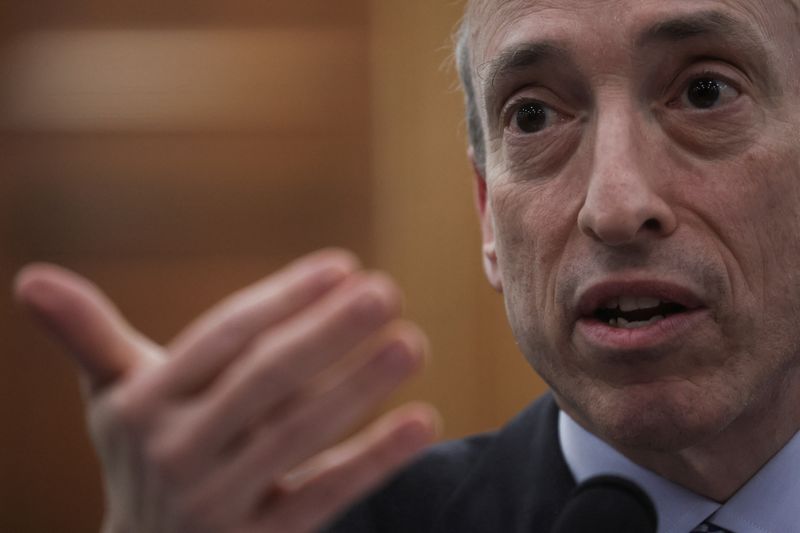
(Reuters) - The U.S. House of Representatives on Wednesday passed a bill that aims to create a new legal framework for digital currencies, despite an unusual warning from the U.S. securities regulator it could create new financial risks.
The Republican-sponsored Financial Innovation and Technology for the 21st Century Act passed in a bipartisan 279-136 vote. It is not clear if the Senate will take up the measure.
The bill's supporters in the U.S. Congress argue that the bill will provide regulatory clarity and help promote the industry's growth.
The House approval comes as the U.S. Securities and Exchange Commission (SEC) signals that it will likely approve applications for spot ether exchange-trade funds in a surprising boost to the industry.
But SEC Chair Gary Gensler said in a statement that the bill "would create new regulatory gaps and undermine decades of precedent regarding the oversight of investment contracts, putting investors and capital markets at immeasurable risk."
The bill was backed by crypto supporters and industry organizations who have long viewed Gensler's SEC as an impediment to the wider adoption of digital assets.
Noting high-profile prosecutions, fraud cases, bankruptcies and failures, Gensler has maintained that cryptocurrencies should be subject to the same laws as other assets.
In Wednesday's statement, he said under the bill investment contracts recorded on a blockchain would no longer be deemed securities, denying investors protection under securities laws.
Among other criticisms, Gensler said the bill would also allow issuers of crypto investment contracts to certify themselves that their own products are digital commodities not subject to SEC oversight, leaving the agency just 60 days to challenge this.
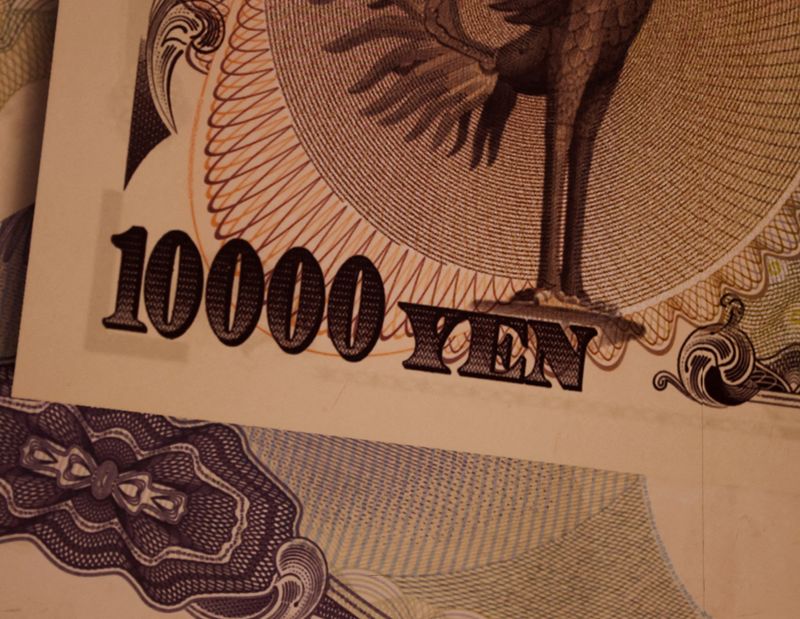
By Kiyoshi Takenaka
TOKYO (Reuters) - Nearly half of Japanese firms find the yen's slide beyond 155 to the dollar harmful to their business, roughly double the percentage of those who see the currency's weakness as a positive, a Reuters survey showed on Thursday.
The yen, under pressure from a wide gap between interest rates in the United States and Japan, plunged to a 34-year low of 160.245 yen a dollar late last month. But it has since recovered some ground to around 156.36 after suspected rounds of intervention by Japanese authorities.
More than a third of Japanese companies want the Bank of Japan to raise interest rates further in response to the yen's softer trend, the survey also showed, indicating they are willing to face higher borrowing costs to support the currency.
The yen has lost roughly 10% against the dollar so far this year despite the BOJ's decision in March to end eight years of negative rates.
The poll showed 16% of respondents regarded the yen's fall beyond 155 per dollar as greatly negative to their operations and 32% saw it as somewhat negative, while a combined 25% said it would be either greatly or somewhat positive.
"I very much fear Japan's consumer market might contract (due to a weak yen), and that we might get used to it," one manager at a food company wrote.
The weak yen has become a headache for policymakers by cooling consumption. While a boon for exporters and inbound tourism, it increases import costs, adds to inflationary pressures and squeezes households.
The survey showed 37% of respondents wanted the central bank to raise interest rates again to counter the yen's weakness, while 34% wanted the government to intervene in the foreign exchange market to stem the currency's decline.
Thirty percent of companies polled by Reuters said the range of 140-149 yen to the dollar is desirable for them and 28% said the 130-139 yen range is ideal, while no firms regarded the yen trading below 160 yen to the dollar as favourable.
To guard themselves against the yen's depreciation, almost two-thirds of the respondents are looking into raising prices of their products, while 16% are considering switching to the domestic procurement of parts and raw materials, the poll showed.
The survey of 493 companies was conducted for Reuters by Nikkei Research from May 8-17, with companies responding on condition of anonymity. A total of 229 companies responded.
Asked if Japan has exited from deflation once and for all, 27% of respondents said it has and one-third said it has not, with the remaining 40% saying it's hard to tell.
"First, we need to ascertain whether Japan's inflation is being driven by higher costs or growing demand," a manager at a wholesaler said.
Prime Minister Fumio Kishida is counting on high wage growth in recent years to put a decisive end to more than two decades of deflation.

By Gavin Jones and Giuseppe Fonte
ROME (Reuters) - G7 finance chiefs meeting in Italy this week will attempt to find common ground over how to use frozen Russian assets to help Ukraine's war effort and how to address China's growing export strength in key markets, officials said.
Finance ministers and central bankers from the Group of Seven wealthy democracies - the United States, Japan, Germany, France, Britain, Italy and Canada - will gather in the northern Italian lakeside town of Stresa on Friday and Saturday.
G7 negotiators have been discussing for weeks how to best exploit some $300 billion worth of Russian financial assets, such as major currencies and government bonds, which were frozen shortly after Moscow invaded Ukraine in February 2022.
The United States is pushing to find a way to bring forward the future income from those assets, either through issuing a bond or more likely granting Ukraine a loan that it says could provide it with as much as $50 billion in the near term.
However, many legal and technical aspects need to be hammered out, meaning a detailed accord is not expected to be reached in Stresa, several officials said.
In that case, informal talks are set to continue aimed at presenting a proposal to G7 heads of government who will meet in Puglia, southern Italy, on June 13-15.
The idea of the G7 issuing a bond for Ukraine appears to have lost ground, with the U.S. now proposing a loan backed by the income stream from the frozen assets.
Who would administer the loan - the World Bank or some other body - how it would be guaranteed, how future profits can be estimated and what would happen in the event of a peace deal with Russia are all aspects still to be clarified.
European officials are particularly cautious, with one EU diplomat saying it would take "weeks if not months" for a final decision to be made.
'LEGAL IMPLICATIONS'
Italy holds the G7 presidency this year and its Economy Minister Giancarlo Giorgetti said last week the U.S. proposals on the use of the Russian assets had "quite serious legal implications" which still need clarifying.
Japanese Finance Minister Shunichi Suzuki also stressed any agreement must comply with international law.
Russia has repeatedly warned the West of consequences if its assets are touched and accused Washington of bullying Europe to take more radical steps to thwart it in Ukraine.
The prospects for global trade will be another central topic in Stresa after the United States last week unveiled steep tariff hikes on an array of Chinese imports including electric vehicle batteries, computer chips and medical products.
Giorgetti said after the U.S. move that a "trade war" was being fought reflecting geopolitical tensions and warned of the risk of "fragmentation" to global commerce.
The United States is not calling on its partners to take similar measures against China, but an official said it was likely to push for the G7 communique to express common concern for what it calls Beijing's industrial "overcapacity".
U.S. Treasury Secretary Janet Yellen said in Frankfurt on Tuesday the United States and Europe needed to address the threat from Chinese imports in a "strategic and united way" to keep manufacturers viable on both sides of the Atlantic and foster development of their domestic clean energy industries.
Other topics to be discussed in Stresa, according to an official programme issued by the Italian presidency, will include the impact of artificial intelligence on the global economy, and a "stocktaking" on sanctions against Russia.
Taxation will also be on the agenda, with Italy trying to revive a deal on a global minimum tax on multinationals which was signed by around 140 countries in 2021, but has not been fully implemented due to opposition in the U.S. and elsewhere.
A proposal for a global wealth tax on billionaires, which has been promoted by Brazil and France among the broader Group of 20 developed countries, would also be discussed in Stresa but was meeting U.S. resistance, one of the officials said.
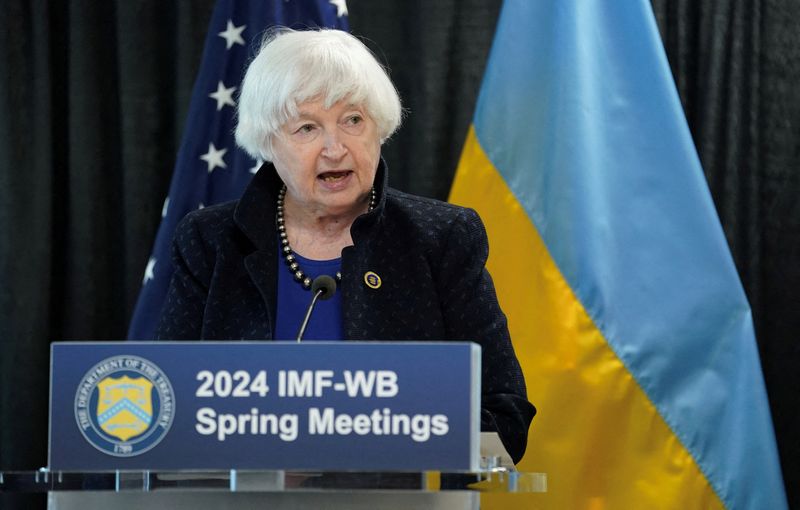
By David Lawder
FRANKFURT (Reuters) -U.S. Treasury Secretary Janet Yellen said on Tuesday that the United States and Europe needed to respond to China's industrial overcapacity in a "strategic and united way" to keep manufacturers viable on both sides of the Atlantic.
Yellen told reporters during a visit to Frankfurt that G7 finance ministers shared U.S. concerns about Chinese efforts to dominate clean energy industries, but did not need "detailed coordination" on trade actions following the imposition of steep U.S. tariffs on Chinese goods.
"But I do think that the concerns about China's strategy are shared and all I'm suggesting is that given that many countries share this concern, it's more forceful to communicate to China as a group," Yellen said.
In remarks on the U.S.-European alliance in Frankfurt, Yellen said China's excess industrial capacity threatened both American and European firms as well as the industrial development of emerging market countries.
"China's industrial policy may seem remote as we sit here in this room, but if we do not respond strategically and in a united way, the viability of businesses in both our countries and around the world could be at risk," she said.
Last week, the Biden administration announced steep new tariffs on Chinese electric vehicles (EVs), solar products, semiconductors, battery parts, steel and other strategic industries.
Yellen had warned Chinese officials on a trip to Guangzhou and Beijing in April that the U.S. would not accept their excess production of these goods that would flood global markets with cheap exports.
In remarks later at the TechQuartier technology and finance incubator in Frankfurt, Yellen said Chinese production in these sectors significantly exceeded global demand, threatening the development of clean energy industries around the world.
The Biden administration was taking action to protect U.S. workers and firms from being undercut by "unfair Chinese economic competition", she said.
She added that Chinese industrial capacity would be a focus of the Group of Seven finance meetings later this week in Stresa, Italy.
"We want to see healthy green technology sectors, from innovative start-ups to green manufacturing factories, in the United States, Europe, and around the world, not just in China," Yellen said.
FROZEN RUSSIAN ASSETS
Yellen, who received an honorary degree from the Frankfurt School of Finance and Management, said the European Union and other countries were taking similar actions to use their own authorities to investigate potential trade remedies for Chinese EVs and other products.
Yellen also said that it was important for the G7 countries to show that they had a plan to channel substantial aid to Ukraine from some $300 billion in frozen Russian assets.
She said that not every detail of the plan with a "completed term sheet" needed to be worked out by the time of the G7 leaders summit in Puglia, Italy, on June 13-15. But the plan needed enough agreement that leaders could seriously consider it.
Earlier, Yellen said the U.S. and European Union should stand together against Russian aggression and Iranian "support for terrorism," including agreeing on a way to unlock the value of some $300 billion worth of frozen Russian sovereign assets to aid Ukraine.
"That's why I believe it's vital and urgent that we collectively find a way forward to unlock the value of Russian sovereign assets immobilized in our jurisdictions for the benefit of Ukraine," Yellen said. "This will be a key topic of conversation during G7 meetings this week."
Yellen also is pushing for the G7 finance leaders to agree at their meetings this week on a plan to use the income stream from the frozen Russian sovereign assets to back a larger loan to Ukraine.
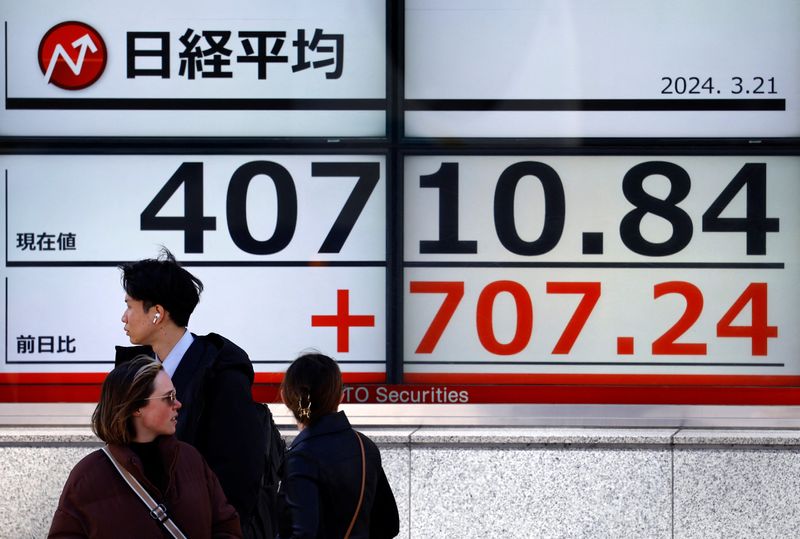
By Hernan Nessi
BUENOS AIRES (Reuters) - Argentina's economic activity index is expected to have shrunk 6.9% year-on-year in March, its deepest drop since 2020 and the fifth monthly contraction in a row, a Reuters poll on Tuesday showed.
The index slipped an estimated 7.2% in March from February, said the 13 local analysts in the survey.
The year-on-year contraction estimates ranged from 4% to 10.3%.
"The decline in sectors linked to domestic consumption, industry and construction is consolidating and deepening," said Pablo Besmedrisnik, economist and director of the consulting firm Invenomica, while noting mining and agriculture are among the sectors showing growth.
By Wayne Cole
SYDNEY (Reuters) - Asian shares edged higher on Wednesday as anxious investors dared to hope AI-diva Nvidia (NASDAQ:NVDA) could meet sky-high expectations, while keeping a wary eye on the outlook for U.S. and UK interest rates.
New Zealand's central bank offered a sobering assessment of its inflation problems, warning that rates would have to be higher for longer to bring them to heel in a shock to local markets.
That saw the kiwi dollar jump 0.9% to a one-month high of $0.6151 as bond yields spiked.
MSCI's broadest index of Asia-Pacific shares outside Japan firmed 0.4%, having already climbed for four straight weeks to reach a two-year top.
Japan's Nikkei eased 0.6% as data showed a weak yen was boosting exports but also stoking imported inflation and weighing on business sentiment.
EUROSTOXX 50 futures and FTSE futures both inched up 0.2%. S&P 500 futures and Nasdaq futures were both a fraction firmer.
Markets are braced for fireworks when Nvidia reports after the bell, with options priced for a swing of 8.7% in either direction, worth $200 billion in market value.
Analysts wonder how much more it can deliver given that the chip-maker already boasts a profit margin of 77%, and its stock is up 93% on the year so far.
"Sentiment is quite positive, with our bars well-above consensus and a sense that management has left some in the tank to surprise positively," said JPMorgan analyst Josh Meyers.
"This suggests that it may take a big upside surprise, on earnings or clearer forward guidance, to get the stock moving any higher."
CENTRAL BANK WATCH
Minutes of the U.S. Federal Reserve's last meeting due later in the day should confirm the next move is still likely down, but policy makers first need more confidence that inflation has resumed its downtrend.
Fed fund futures imply about a 66% chance of a rate cut by September and have 43 basis points of easing priced in for this year.
Figures on UK inflation due later in the session could decide whether the Bank of England eases as early as June, or waits to August.
Forecasts are for core consumer price inflation to slow to 3.6% in April, from 4.2% in March, and anything lower would narrow the odds on a June cut and likely pressure sterling.
The pound was holding just short of two-month highs at $1.2712, while the euro was trading steady at $1.0857, just off its recent top of $1.0895.
The dollar flatlined on the yen at 156.20 as the threat of Japanese intervention stalled its advance.
Gold held firm at $2,424 an ounce, after touching a record high of $2,449.89 early in the week. [GOL/]
Oil prices slipped amid concerns over the peak U.S. driving season, given that demand was seasonally tracking at its lowest since 2020 and retail prices had fallen for four weeks in a row. [O/R]
Brent crude fell 50 cents to $82.38 a barrel, and the spread over futures narrowed further, while U.S. crude lost 54 cents to $78.12 per barrel.
The South American country's industrial production indicator showed a 21.2% slowdown year-on-year in March, government data showed.
Economists remain cautious about the end of the first half-year and beginning of the second half, predicting a gradual recovery.
"We don't see a dizzying recovery in activity for the first half of the year," said Federico Gonzalez Rouco, economist at Empiria Consultores. "We believe that inflation is in a process of deceleration but it is also accumulating risks associated with the foreign exchange market."
Statistics agency INDEC is expected to publish the official figures on Wednesday.

